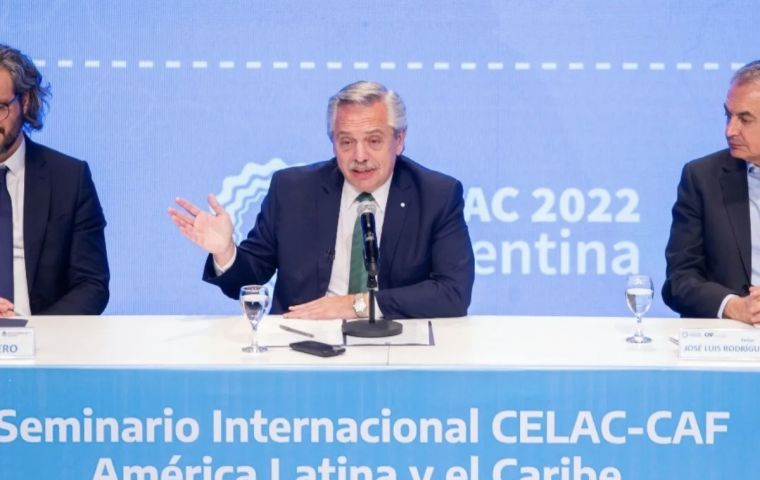MercoPress. South Atlantic News Agency
Argentine President calls for an end to Venezuela, Cuba blockades
 Fernández highlighted Latin America as “a territory of peace” with no countries “armed for war”
Fernández highlighted Latin America as “a territory of peace” with no countries “armed for war” Argentina's Alberto Fernández Thursday called for an “end” to blockades against Cuba and Venezuela during an event at the Kirchner Cultural Center (CCK) in Buenos Aires hosted by the Community of Latin American and Caribbean States (CELAC), of which he currently holds the pro-tempore presidency.
After insisting on the “institutionalization” of CELAC, Fernández pointed out that “We have two blockaded countries and that is unforgivable.”
President Fernández delivered his speech on the closing day of the international seminar “The Future of Integration: Unity in Diversity,” which was attended by several Latin American leaders.
“It would be good for Argentina to initiate the process of institutionalization of Celac. Up to now we are a group of countries that talk and analyze but do not make joint decisions and it is time we did so”, said Fernández, who feared something similar to Unasur's dissolution might happen if measures are not taken so that CELAC “acquires another strength, another dimension and also represents us adequately, allowing us to make a community decision” that it is not left to “the discretion of each country.”
“We must work together, so that blockades are ended in this continent,” which earned him a firm applause from the audience. “We have two blockaded countries and that is unforgivable”, he added in reference to Cuba and Venezuela.
The group must “take advantage of peace and unity to achieve development and social justice,” Fernández argued. “We must put our Latin American rights before anything else to be able to achieve those objectives, which were dreamed before us by others: San Martin, Bolivar, Sucre, Hidalgo, Marti. Let us copy such great beings.”
“A singular continent, which has had to face the dilemma of unity at a singular moment in the history of humanity. The 21st century has already given us the first catastrophe, the pandemic,” he said, adding that “a virus” exposed “the weakness of the economic system in which we live and was capable of toppling economic empires.”
He also pointed out that “there is a kind of passive promoters of war between Ukraine and Russia, who do not send troops but weapons and let the conflict escalate.”
“This is today's world, which will surely bring about a new geopolitical reality that we will not be able to dominate, but we can dominate the path that our continent assumes. We can make the decision to unite to face any bad moment,” Fernández stressed.
He added that the region has “a great opportunity and an enormous challenge” ahead, which consists of “supplying renewable energies and food in quantity” to the rest of the world.
“Between Chile, Bolivia, and Argentina we are 60% of the lithium that the world will need, we have the perfect conditions to develop wind energy, green hydrogen, solar energy” and “we have to stop exporting raw material and industrialize it,” Fernández stressed.
He also highlighted Latin America was “a territory of peace” with no countries “armed for war” despite being “in the most unequal continent in the world.”
Also attending the closing ceremony were former Spanish Prime Minister José Luis Rodríguez Zapatero; the former President of Colombia, Ernesto Samper; the former President of Guatemala, Vinicio Cerezo; and Argentine Foreign Minister, Santiago Cafiero, while former Uruguayan President Pepe Mujica and Mexico's current President Andrés Manuel López Obrador made online appearances.
Cafiero urged CELAC countries to deepen “unity in diversity” so that region has the possibility of “growing with more equality and justice.”
“This is a great opportunity to listen and gather elements for an increasingly united region. It is a space for reflection and exchange on where integration is at and on the challenges ahead,” Cafiero said.
“Together in diversity we will be able to generate local work and increasingly diversified products,” he stressed.




Top Comments
Disclaimer & comment rulesCommenting for this story is now closed.
If you have a Facebook account, become a fan and comment on our Facebook Page!